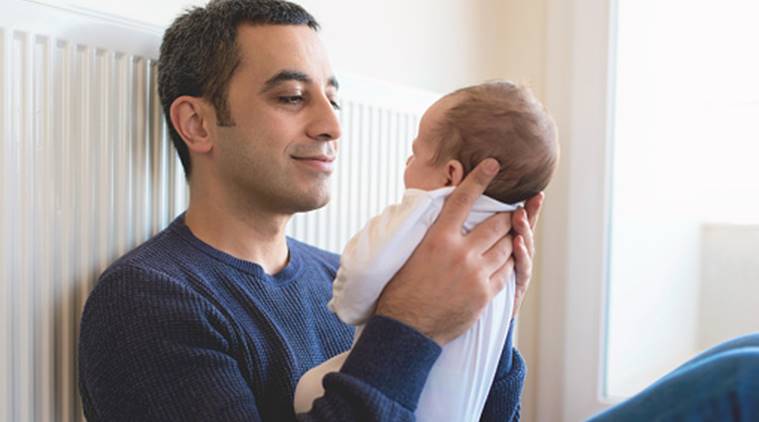
While new mothers develop intense bonding with their babies, fathers may not be able to feel it immediately. We spoke to a parenting coach to know the reasons behind it and asked for tips to help dads feel connected to the newborn.

As much as we appreciate hands-on dads bonding with their child, it can take time to develop a connection after the baby is born, according to research. Unlike mothers, fathers, in some cases, take more time to bond with their baby.
One of the primary reasons is that fathers are evolutionarily expected to be the provider and protector of the baby and the mother. A study by Oxford University’s Department of Experimental Psychology highlights how men end up “in quite traditional structures where mother raised the child and father worked to support them.”
Why fathers may not bond with the baby immediately
While mothers usually bond with the baby intensely, fathers look at it as a new responsibility. Men have the ability to be away from the baby, which impacts their bond with the infant too, Dr Debmita Dutta, parenting coach and founder, What Parents Ask, told Express Parenting.
A newborn is entirely dependent on his or her mother for being breastfed and looked after, leaving not much for the father to do in terms of directly bonding with the baby. And with him becoming the secondary caregiver, there are also chances of postnatal depression. As per Dr Anna Machin, who led the Oxford University study, postnatal depression in men is identified as a “tension between their need to provide and the wish to be at home” and is definitely a “real phenomenon”.

Again, mothers tend to have hormonal advantages over fathers, which helps them bond better. “Mothers bond with their child through pregnancy, the birthing process or breastfeeding. Oxytocin, the bonding hormone is also the birthing hormone which makes the uterus contract and pushes the baby out. Prolactin, on the other hand, not only produces milk but also promotes parenting. And there is cortisol which improves attentiveness towards the baby,” Dr Dutta explained.
Also Read: Balancing work and family: A Dad’s perspective
Why fathers need to bond with their child
In today’s scenario, a lot of women are equal participants in providing for the family. Dr Dutta asserted, “It is very important for fathers today to bond with their babies because, in many ways, the protector-provider role has become redundant. Women are equally able to protect and provide for themselves. If men are unable to reinvent their role in the family, they will soon be left out of the whole equation.”
Traditionally, taking care of the child has been a woman-oriented duty, which, in turn, tends to exclude the father from the process due to what is called “maternal gatekeeping”. Families, instead, should allow fathers to be actively involved since it will help them bond with the baby more. This will also have positive impact on his mental health. “It’s important for fathers to be a part of the whole scenario, although it is not socially acceptable in some societies even now,” said Dr Dutta.
Moreover, newborns with involved fathers are more likely to be emotionally secure, eager to explore and more sociable, as per a study by Father Involvement Research Alliance.
Tips for new dads to bond with the baby
According to Dr Dutta, fathers begin to bond with the baby around three months after birth. That’s because fathers feel more comfortable in handling the baby when he or she is less delicate. She also suggested the following tips for new dads to help them bond with their babies:
1. Be around the baby: An ideal way to bond with a baby, especially when he or she cannot communicate, is to spend time together. This becomes a challenge sometimes since men do not get paternity leave. There’s not much you can do with a newborn but just being around also helps.
2. Skin-to-skin contact: Just a safe, protective touch can work wonders in terms of bonding between two people. So, skin-to-skin touch is one of the best ways to bond with the baby. Just holding the baby is enough.
3. Shared activities: Fathers need to share duties in matters related to the baby like changing the diaper or support the mother when she is breastfeeding. These skills don’t come naturally and have to be learned.
4. Take leaves: Plan your leaves and utilise them for taking care of the newborn along with the mother.
Source: Read Full Article